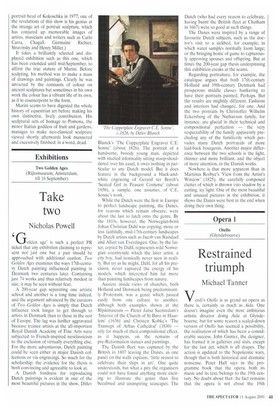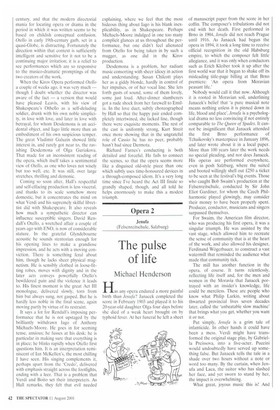Opera l
Otello (Glyndebourne)
Restrained triumph
Michael Tanner
Verdi's Otello is as grand an opera as there is, certainly as much as Aida. One doesn't imagine even the most ambitious artistic director doing Aida at Glyndebourne, but for some reason a scaled-down version of Otello has seemed a possibility, the realisation of which has been a considerable success. John Gunter, the designer, has framed it in galleries and slats, except for the last act, which is all drapes. The action is updated to the Napoleonic wars, though that is both historical and dramatic nonsense. Peter Hall says in the programme book that the opera, both its music and its text, belongs to the 19th century. No doubt about that: the fact remains that the opera is not about the 19th century, and that the modern directorial mania for locating opera or drama in the period in which it was written seems to be based on childish conceptual confusion. Otello in early 19th-century garb, set in a quasi-Globe, is distracting. Fortunately the direction within that context is sufficiently intelligent and sensitive for it not to be a continuing major irritation; it is a relief to see performances which are so responsive to the musico-dramatic promptings of the two creators of the work.
When the Kirov Opera performed Otello a couple of weeks ago, it was very much though I doubt whether the director was aware of the fact — a version that would have pleased Leavis, with his view of Shakespeare's Othello as a self-deluding soldier, drunk with his own noble simplicity, in love with love, and later in love with betrayal, for whom Desdemona is an accidental object. and Iago little more than an embodiment of his own suspicious temper. The great Vladimir Galuzin showed little interest in, and rarely got near to, the ravishing Desdemona of Olga Guriakova. That made for an inconsistent reading of the opera, which itself takes a sentimental view of °tell°, as one who loves not wisely but too well, etc. It was still, over large stretches, thrilling and demonic.
Coming so soon after, Hall's respectful and self-effacing production is less visceral, and thanks to its scale somehow more domestic, but it concentrates the mind on what Verdi and his supremely skilful librettist did with Shakespeare. It also reveals how much a sympathetic director can influence susceptible singers, David Rendall's Otello, a wretched affair a couple of years ago with ENO, is now of considerable stature. In the grateful Glyndebourne acoustic he sounds stentorian enough for his opening lines to make a grandiose impression, and he acts with a moving conviction. There is something feral about him, though he lacks sheer physical magnetism. He is sensibly clothed in loose-fitting robes, moves with dignity and in the later acts conveys powerfully Otello's bewildered pain and the violence it leads to. His finest moment is the great Act III monologue, delivered slowly, torn from him but always sung, not gasped. But he is hardly less noble in the final scene, again moving partly by virtue of its restraint.
It says a lot for Rend all's imposing performance that he is not upstaged by the brilliantly withdrawn 'ago of Anthony Michaels-Moore. He goes in for seeming tense, anxious; he fusses at his desk; he is particular in making sure that everything is in place; he blinks rapidly when Otello first questions him. It is an interpretation reminiscent of Ian McKellen's, the most chilling I have seen. His singing complements it, perhaps apart from the 'Credo', delivered with emphasis straight across the footlights, ending with a leer. That is a problem that Verdi and Boito set their interpreters. As Hall remarks, they felt that evil needed
explaining, where we feel that the most hideous thing about Iago is his blank inexplicability, as in Shakespeare. Perhaps Michaels-Moore indulged in one too many complicit glances at us throughout the performance, but one didn't feel alienated from Otello for being taken in by such a mugger, as one did in the Kirov production.
Desdemona is a problem, her radiant music consorting with sheer idiocy in action and understanding. Susan Chilcott plays her as a giddy blonde, hardly in control of her impulses, or of her vocal line. She lets forth gusts of sound, some of them lovely, some just loud. After-dinner slumberers got a rude shock from her farewell to Emilia. In the love duet, subtly choreographed by Hall so that the happy pair ended completely intertwined, she lacked line, though there were exquisite moments. The rest of the cast is uniformly strong, Kurt Streit once more showing that in the ungrateful role of Cassio he has no peer, probably hasn't had since Dermota.
Richard Farnes's conducting is both detailed and forceful. He fails to connect the scenes, so that the opera seems more like a disguised old-style piece than one which subtly uses time-honoured devices in a through-composed idiom. It's a very long time since I've heard the Act III finale so grandly shaped, though, and all told he helps enormously to make this a modest triumph.



























































 Previous page
Previous page